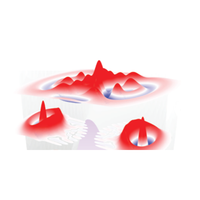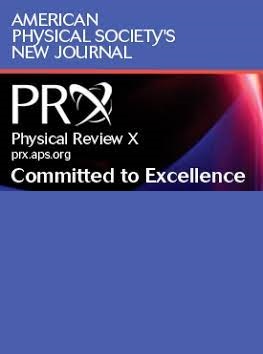双阱参量振荡器中的成对电平退变性和阿伦尼乌斯定律的量子态观测
IF 15.7
1区 物理与天体物理
Q1 PHYSICS, MULTIDISCIPLINARY
引用次数: 0
摘要
通过对专门设计的约瑟夫森电路施加微波驱动,我们实现了一个双阱模型系统:一个受挤压力作用的克尔振荡器。我们首次观察到了量子双阱哈密顿的光谱指纹,当其势垒高度增加时:激发态在势垒下沉时,与隧道分裂的指数减少相对应的成对水平亲吻(凝聚)。井中的离散能级还表现在穿越势垒的活化时间上,它不是作为势垒高度的函数平滑增加,而是每当一对激发态被井捕获时就会出现阶跃。这一实验说明了阿伦尼乌斯定律的量子机制,而低耗散、时间分辨状态控制、98.5% 的量子非拆迁单次测量保真度以及对量子机制中所有哈密顿参数的完全微波控制等前所未有的组合使这一观察成为可能。本文讨论了量子计算和模拟的直接应用。本文章由计算机程序翻译,如有差异,请以英文原文为准。

Observation of Pairwise Level Degeneracies and the Quantum Regime of the Arrhenius Law in a Double-Well Parametric Oscillator
By applying a microwave drive to a specially designed Josephson circuit, we have realized a double-well model system: a Kerr oscillator submitted to a squeezing force. We have observed, for the first time, the spectroscopic fingerprint of a quantum double-well Hamiltonian when its barrier height is increased: a pairwise level kissing (coalescence) corresponding to the exponential reduction of tunnel splitting in the excited states as they sink under the barrier. The discrete levels in the wells also manifest themselves in the activation time across the barrier which, instead of increasing smoothly as a function of the barrier height, presents steps each time a pair of excited states is captured by the wells. This experiment illustrates the quantum regime of Arrhenius’s law, whose observation is made possible here by the unprecedented combination of low dissipation, time-resolved state control, 98.5% quantum nondemolition single shot measurement fidelity, and complete microwave control over all Hamiltonian parameters in the quantum regime. Direct applications to quantum computation and simulation are discussed.
求助全文
通过发布文献求助,成功后即可免费获取论文全文。
去求助
来源期刊

Physical Review X
PHYSICS, MULTIDISCIPLINARY-
CiteScore
24.60
自引率
1.60%
发文量
197
审稿时长
3 months
期刊介绍:
Physical Review X (PRX) stands as an exclusively online, fully open-access journal, emphasizing innovation, quality, and enduring impact in the scientific content it disseminates. Devoted to showcasing a curated selection of papers from pure, applied, and interdisciplinary physics, PRX aims to feature work with the potential to shape current and future research while leaving a lasting and profound impact in their respective fields. Encompassing the entire spectrum of physics subject areas, PRX places a special focus on groundbreaking interdisciplinary research with broad-reaching influence.
 求助内容:
求助内容: 应助结果提醒方式:
应助结果提醒方式:


